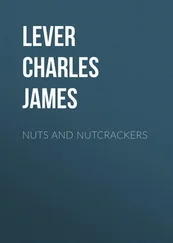Charles Lever - Diary And Notes Of Horace Templeton, Esq. Volume II
Здесь есть возможность читать онлайн «Charles Lever - Diary And Notes Of Horace Templeton, Esq. Volume II» — ознакомительный отрывок электронной книги совершенно бесплатно, а после прочтения отрывка купить полную версию. В некоторых случаях можно слушать аудио, скачать через торрент в формате fb2 и присутствует краткое содержание. Жанр: literature_19, foreign_antique, foreign_prose, на английском языке. Описание произведения, (предисловие) а так же отзывы посетителей доступны на портале библиотеки ЛибКат.
- Название:Diary And Notes Of Horace Templeton, Esq. Volume II
- Автор:
- Жанр:
- Год:неизвестен
- ISBN:нет данных
- Рейтинг книги:5 / 5. Голосов: 1
-
Избранное:Добавить в избранное
- Отзывы:
-
Ваша оценка:
- 100
- 1
- 2
- 3
- 4
- 5
Diary And Notes Of Horace Templeton, Esq. Volume II: краткое содержание, описание и аннотация
Предлагаем к чтению аннотацию, описание, краткое содержание или предисловие (зависит от того, что написал сам автор книги «Diary And Notes Of Horace Templeton, Esq. Volume II»). Если вы не нашли необходимую информацию о книге — напишите в комментариях, мы постараемся отыскать её.
Diary And Notes Of Horace Templeton, Esq. Volume II — читать онлайн ознакомительный отрывок
Ниже представлен текст книги, разбитый по страницам. Система сохранения места последней прочитанной страницы, позволяет с удобством читать онлайн бесплатно книгу «Diary And Notes Of Horace Templeton, Esq. Volume II», без необходимости каждый раз заново искать на чём Вы остановились. Поставьте закладку, и сможете в любой момент перейти на страницу, на которой закончили чтение.
Интервал:
Закладка:
The Bauer told Fritz that the journey was a long one, and true enough. It lay across the Zillerthal, where the garnets are found, and over the great mountains that separate the Austrian from the Bavarian Tyrol – many a long, weary mile – many, I say, because the Bauer had come up to Inspruck to buy hemp for spinning when the evenings of winter are long and dark, and poor people must do something to earn their bread. This load of hemp was carried on a little wheeled cart, to which the old man himself was harnessed, and in front of him his dog – a queer-looking team would it appear to English eyes, but one meets them often enough here; and as the fatigue is not great, and the peasants lighten the way by many a merry song – as the Tyrol “Jodeln” – it never suggests the painful idea of over-hard or distressing labour. Fritzerl soon took his place as a leader beside the dog, and helped to pull the load; while the Starling’s cage was fastened on the sheltered side of the little cart, and there he travelled quite safe and happy.
I never heard that Fritz was struck – as he might possibly, with reason, have been – that, as he came into Bavaria, where the wide-stretching plains teem with yellow corn and golden wheat, the peasants seemed far poorer than among the wild mountains of his own Tyrol; neither have I any recollection that he experienced that peculiar freedom of respiration, that greater expansion of the chest, travellers so frequently enumerate as among the sensations whenever they have passed over the Austrian frontier, and breathed the air of liberty, so bounteously diffused through the atmosphere of other lands. Fritz, I fear, for the sake of his perceptive quickness, neither was alive to the fact nor the fiction above quoted; nor did he take much more notice of the features of the landscape, than to mark that the mountains were further off and not so high as those among which he lived – two circumstances which weighed heavily on his heart, for a Dutchman loves not water as well as a Tyroler loves a mountain.
The impression he first received did not improve as he drew near the Dorf where the old Bauer lived, The country was open and cultivated; but there were few trees: and while one could not exactly call it flat, the surface was merely a waving tract that never rose to the dignity of mountain. The Bauer houses, too, unlike the great wooden edifices of the Southern Tyrol – where three, ay, sometimes four, generations may be found dwelling under one roof – were small, misshapen things, half stone, half wood. No deep shadowing eave along them to relieve the heat of a summer sun; – no trellised vines over the windows and the doorway; – no huge yellow gourds drying on the long galleries, where bright geraniums and prickly aloes stood in a row; – no Jâger either, in his green jacket and gold-tas-selled hat, was there, sharing his breakfast with his dog; the rich spoils of his day’s sport strewed around his feet – the smooth-skinned chamois, or the stag with gnarled horns, or the gorgeously-feathered wild turkey, all so plentiful in the mountain regions. No; here was a land of husbandmen, with ploughs, and harrows, and deep-wheeled carts, driven along by poor-looking, ill-clad peasants, who never sung as they went along, scarce greeted each other as they passed.
It was true, the great plains were covered with cattle, but to Fritz’s eyes the prospect had something mournful and sad. It was so still and silent. The cows had no bells beneath their necks like those in the Alpine regions; nor did the herds jodeln to each other, as the Tyrolers do, from cliff to cliff, making the valleys ring to the merry sound. No, it was as still as midnight; not even a bird was there to cheer the solitude with his song.
If the aspect without had little to enliven Fritz’s spirits, within doors it had even less. The Bauer was very poor; his hut stood on a little knoll outside the village, and on the edge of a long tract of unreclaimed land, which once had borne forest-trees, but now was covered by a low scrub, with here and there some huge trunk, too hard to split, or too rotten for firewood. The hut had two rooms; but even that was enough, for there was nobody to dwell in it but the Bauer, his wife, and a little daughter, Gretchen, or, as they called her in the Dorf, “Grettl’a.” She was a year younger than Fritz, and a good-tempered little “Mädle;” and who, but for over-hard work for one so young, might have been even handsome. Her eyes were large and full, and her hair bright-coloured, and her skin clear; yet scanty food and continual exposure to the air, herding the goats, had given her a look of being much older than she really was, and imparted to her features that expression of premature cunning which poverty so invariably stamps upon childhood. It was a happy day for Grettl’a that brought Fritz to the cottage; not only because she gained a companion and a playfellow, but that she needed no longer to herd the goats on the wild, bleak plain, rising often ere day broke, and never returning till late in the evening. Fritz would do all this now; and more, he would bring in the firewood from the little dark wood-house, where she feared to venture after nightfall; and he would draw water from the great deep well, so deep that it seemed to penetrate to the very centre of the earth. He would run errands, too, into the Dorf; and beetle the flax betimes; – in fact, there was no saying what he would not do. Fritz did not disappoint any of these sanguine expectations of his usefulness; nay, he exceeded them all, shewing himself daily more devoted to the interests of his humble protectors. It was never too early for him to rise from his bed – never too late to sit up when any work was to be done; always willing to oblige – ever ready to render any service in his power. Even the Bauer’s wife, a hard-natured, ill-thinking creature, in whom poverty had heightened all the faults, nor taught one single lesson of kindliness to others who were poor, – even she felt herself constrained to moderate the rancour of her harshness, and would even at times vouchsafe a word or a look of good humour to the little orphan boy. The Bauer himself, without any great faults of character, had no sense of the fidelity of his little follower. He thought that there was a compact between them, which, as each fulfilled in his own way, there was no more to be said of it. Gretchen more than made up for the coldness of her parents. The little maiden, who knew by hard experience the severe lot to which Fritz was bound, she felt her whole heart filled with gratitude and wonder towards him. Wonder, indeed; for not alone did his services appear so well performed, but they were so various and so numerous. He was every where and at every thing; and it was like a proverb in the house – “Fritz will do it.” He found time for all; he neglected – stay, I am wrong – poor little fellow, he did neglect something – something that was more than all; but it was not his fault. Fritz never entered the village church – he never said a prayer; he knew nothing of the Power that had created him, and all that he saw around him. If he thought on these things, it was with the vague indecision of a mind without guidance or direction. Why, or how, and to what end, he and others like him, lived or died, he could not, by any effort, conceive. Fritz was a bondman – as much a slave as many who are carried away in chains across the seas, and sold to strange masters. There was no bodily cruelty in his servitude; he endured no greater hardships than poverty entails on millions; his little sphere of duties was not too much for his strength; his humble wants were met, but the darkest element of slavery was there! The daily round of service over, no thought was taken of that purer part which in the Peasant claims as high a destiny as in the Prince. The Sunday saw him go forth with his flock to the mountain like any other day; and though from some distant hill he could hear the tolling bell that called the villagers to prayer, he knew not what it meant. The better dresses and holiday attire suggested some notion of a fete-day; but as he knew there were no fête-days for him, he turned his thoughts away, lest he should grow unhappy.
Читать дальшеИнтервал:
Закладка:
Похожие книги на «Diary And Notes Of Horace Templeton, Esq. Volume II»
Представляем Вашему вниманию похожие книги на «Diary And Notes Of Horace Templeton, Esq. Volume II» списком для выбора. Мы отобрали схожую по названию и смыслу литературу в надежде предоставить читателям больше вариантов отыскать новые, интересные, ещё непрочитанные произведения.
Обсуждение, отзывы о книге «Diary And Notes Of Horace Templeton, Esq. Volume II» и просто собственные мнения читателей. Оставьте ваши комментарии, напишите, что Вы думаете о произведении, его смысле или главных героях. Укажите что конкретно понравилось, а что нет, и почему Вы так считаете.












